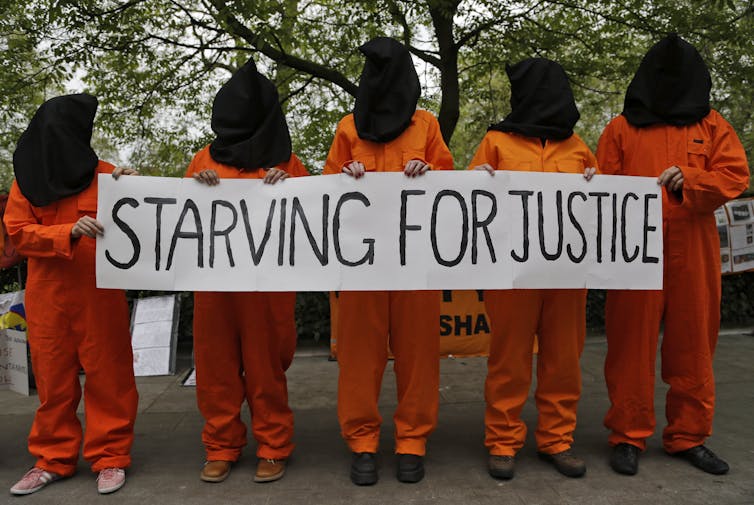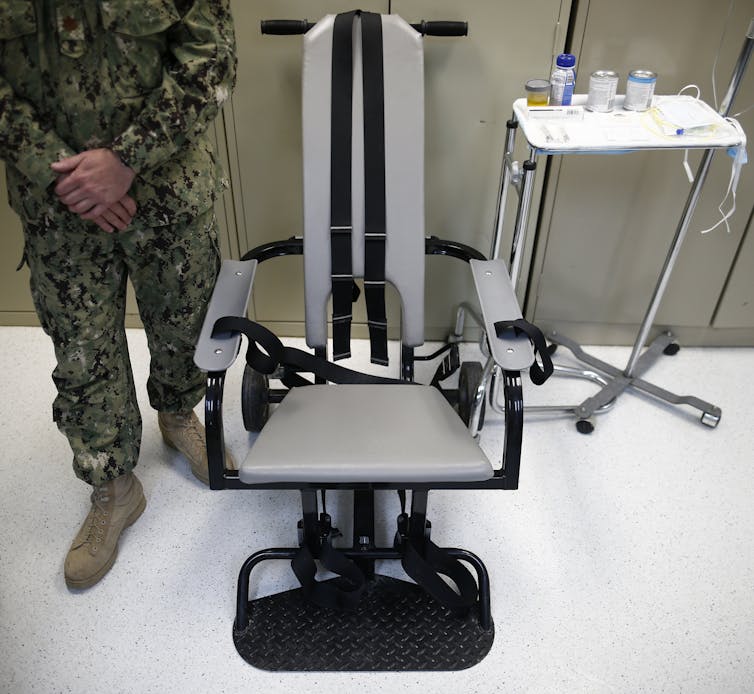Organizations ranging from the ACLU to Human Rights Watch condemn the practice as “inherently cruel, inhuman, and degrading,” writes A. Naomi Paik.

(AP Photo/Lefteris Pitarakis)
By A. Naomi Paik, University of Illinois at Urbana-Champaign
The Conversation
U.S. Immigration and Customs Enforcement, or ICE, is force-feeding nine detainees who are on a hunger strike at a detention center in El Paso, Texas.
The protesters are mostly from India and are being held in ICE custody while their asylum or immigration cases are processed. Since the beginning of the year, they have been protesting their detainment and mistreatment by guards who they allege have threatened them with deportation and withheld information about their cases, according to the detainees’ lawyers.
In mid-January, a federal court ordered ICE to force-feed the strikers. An ICE official stated: “For their health and safety, ICE closely monitors the food and water intake of those detainees identified as being on a hunger strike.” ICE policy states that the agency authorizes “involuntary medical treatment” if a detainee’s health is threatened by hunger striking.
Force-feeding involves tying a detainee to a bed, inserting a feeding tube down the nose and esophagus and pumping liquid nutrition into the stomach. ICE detainees have reported rectal bleeding and vomiting as a consequence of being force-fed.
As I write in my book “Rightlessness” and research published elsewhere, this is not the first time U.S. government agencies have force-fed people in its custody.
Since 2005, the U.S. military has force-fed detainees at the Guantánamo Bay naval base whenever they would go on a hunger strike to protest their indefinite detention.
Force-feeding at Guantánamo
The U.S. military has indefinitely detained individuals at Guantánamo in the “war on terror” since 2002.
Hunger strikes have plagued Guantánamo since it opened in 2002. In one of the largest hunger strikes to occur in a U.S. detention facility, about 500 detainees stopped eating under the slogan “starvation until death” in late June 2005.
They began this strike to protest the conditions of their confinement, including alleged beatings, abuse of their religious freedom by mishandling the Koran and indefinite detention without trial.

(AP Photo/Charles Dharapak)
In response, military doctors authorized “involuntary intravenous hydration and/or enteral tube feeding” – in other words, IV treatment and force-feeding.
Prisoners found ways to get around the feedings, like making themselves vomit or siphoning out their stomachs by sucking on the external end of the feeding tube.
The strike overwhelmed camp commanders. In December 2005, they called in help from the Federal Bureau of Prisons, which had previously authorized force-feeding. The consultants observed as strikers were force-fed twice a day and recommended using the emergency restraint chair, a “padded cell on wheels.”
That requires strapping detainees down onto the chair, making it easier for guards to insert and remove a feeding tube. Detainees referred to it as the “execution chair.” This had the desired effect on the prisoners: Only a handful continued the hunger strike and it was over by February 2006. The camp ordered 20 more chairs.
A Painful Process
In 2013, a widespread hunger strike again swept through Guantánamo – 106 of 166 prisoners participated. Forty-one detainees met the requirements for being force-fed: skipping nine consecutive meals or their BMI dropping below 85 percent of their intake weight.
One participant, Samir Naji al Hasan Moqbel, a Yemini citizen detained for 11 years, told The New York Times, “I had never experienced such pain” as from the feedings.

(AP Photo/Charles Dharapak)
Detainees who participated in the numerous strikes over the years have consistently described the force-feeding process, including having teams of five guards who hold down the prisoner, as torture. Some reported being overfed to the point where they vomited up what was forced down their throats.
“I will not eat until they restore my dignity,” Moqbel said. He said he hoped “that because of the pain we are suffering the eyes of the world will once again look to Guantanamo before it is too late.”
Legal Challenges
Guantánamo hunger strikers filed lawsuits against the U.S. government for force-feeding prisoners and using the restraint chair.
Several judges ruled that force-feedings are legal. In one case, a judge wrote that it did not constitute a violation of the Eighth Amendment against cruel and unusual punishment. Rather, she wrote that administrators “are acting out of a need to preserve the life of the Petitioners rather than letting them die.”
This contradicts what many experts the medical and human rights professionals have said about force-feeding.
The World Medical Association, an international medical ethics organization, asserted that force-feeding is “unjustifiable.” Organizations ranging from the ACLU to Human Rights Watch condemn the practice as “inherently cruel, inhuman, and degrading.”
Another federal judge in a 2009 followed a Supreme Court ruling deciding that courts have no jurisdiction over Guantánamo – a camp physically located in Cuba but governed by the United States.
Similarly, federal courts have limited power to intervene on behalf of the ICE detainees because immigrant detention is not considered punishment and thus not protected by due process rights. In Wong Wing v. United States(1896), the Supreme Court ruled that “the Constitution does not apply to the conditions of immigrant detention.”
While the courts can authorize interventions requested by the government such as force-feeding, immigrant detainees have limited power to appeal to courts about the conditions of their detention.
As with the Guantánamo detainees, migrants are risking starvation, but not because they want to die. As Amrit Singh, the uncle of two men being force-fed, stated, “They want to know why they are still in the jail and want to get their rights and wake up the government immigration system.” Hunger striking offers one of few ways they can protest their prolonged confinement in pursuit of this goal.![]()
A. Naomi Paik is assistant professor of Asian American studies, University of Illinois at Urbana-Champaign.
This article is republished from The Conversation under a Creative Commons license. Read the original article.

Why not put them on a plane to India and allow them to come back through the proper channels?
The burden of proof is on those who want to do that – why not just let them come in and let the free market and property rights handle immigration as it does everything else?
B/c that results in the USA becoming a 3rd world toilet.
Just like the places these people are trying to leave.
Personally, I prefer Americans compete for living wages and healthy living conditions.
Not working for $4/day and sleeping 12 to a room.
Call me ol’ fashioned…
This article saddens me- the stark reality that we-the people-are bombarded with “fake news”- not Trump-esque fake news, but one sided, racially biased, culturally biased, socially biased reports of what is taking place by America. What is moral about force feeding those who protest their treatment at Guantanamo? These detainees are being detained for what reason/s? Can our government be honest with us and tell us who is there and what they are accused of? We are a barbaric nation, we resolve our differences with bullying and guns. We are not the nation that our fore fathers envisioned. We are selfish, lazy and unwilling to give beyond what this world needs to truly get better. I know that these are negative statements. I know that there are good, hard working, moral Americans who work to make things better- at whatever level this describes you, thank you. Please engage yourself with current events and be the voice for the voiceless. THANK YOU TO A. Naomi Paik for exposing the truth.
I do not understand the idea of hunger strike or force feeding. I get that it is a protest and we as a people do not want these people to die. However, do these detainees have the option of returning to their home country? If so, why not choose to go home or wait their turn in the asylum line? If they just want to die then who are we to take that option from them. It may sound heartless but I can understand that if that is their desire, we should not be quilted into submission to demands that provide benefits beyond what are given to others in the same situation.
Most of the Guantánamo detainees were forcibly taken out of their own, or other, countries and have not be given the right to trial or to go home. Other detainees at other centers of detention are fleeing from repression or death threats in their homelands. Some are just seeking better lives. They are being held as criminals for seeking refuge. They deserve humane treatment, not torture. They are on hunger strike against the inhumane treatment they are receiving. The majority haven’t been accused of any actual crime, let alone been tried and convicted.
I agree and what’s more in “Holy India” they force the “untouchables” to live in squalor while the “Invisibles” are daily shamed, so why don’t these “prisoners” in the USA get their own homeland sorted out where a bunch of Americans caught without adequate papers would be in a deep hole somewhere in Calcutta where they would probably be happy to be force fed.
Trojan Horse….
Strike the sad violin music now…..
These dystopian camps, which target innocent children and not criminals, political or otherwise, will be known by future generations as the neoliberal equivalent of the Gulag (except worse) and the Nazi camps (not that bad).
Humanitarianism has some bizarre manifestations. Can you imagine being mugged by someone who threatens you, “Give me your money or I’ll punch myself in the face!”
There is an old joke in my family – “It serves mother right that my feet get cold if she won’t buy me any shoes.”
Its simply a perversion. Logic turned around in favor of emotions. If you know who benefits from these emotions (and why only in public), you know why they are doing it, even though it has no logical basis.
Torture has been part of US policy from it’s very beginning. Our exceptional moral standing is a gruesome joke.
After 9/11 the USA went total fascist, and loss all respect for human rights. This was a declaration to the world that the USA doesn’t give a damn about humanity. A nation who subscribes to this sorry mantra of evil is not a nation of decency nor should it be honored for it’s self proclaimed exceptional status. The USA is a walking zombie of a once promising republic. Enough said, I won’t beleaguer you here with my disgust and sorrow. Peace!
I am deeply ashamed for this nation, the one I was born in. This is horrific, sadly it doesn’t start here.
I read this piece from the Independent on Venezuela and it brought to mind all the crimes against humanity this country has waged. http://www.informationclearinghouse.info/51080.htm
It’s overwhelming. We’re done!
But the United States is a force for good in this world….just ask Mr. Pompous.